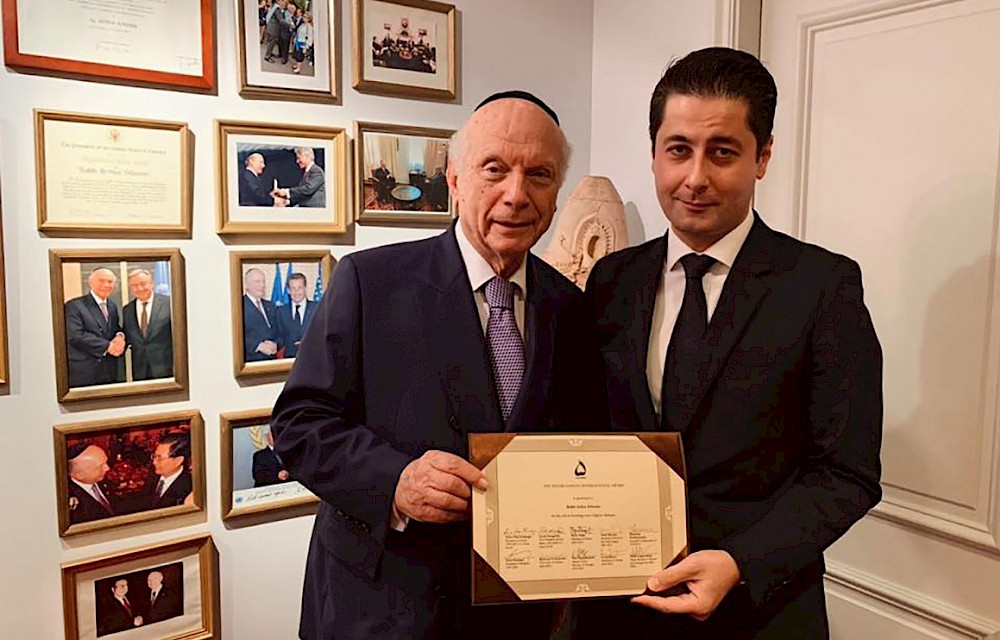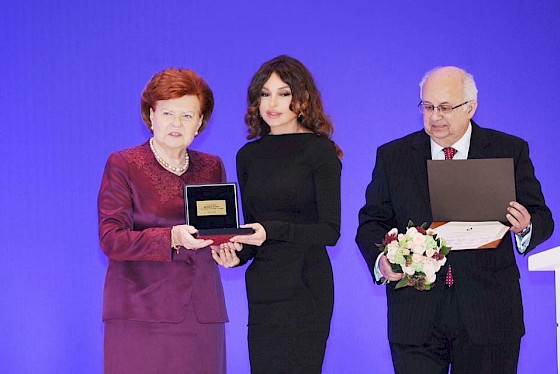BAKU FORUM USES MEDIEVAL POET TO PROMOTE HUMAN RIGHTS
14.02.2019 / This year’s topic is “a new foreign policy”

The 2018 winner of Nizami award was Austrian-American rabbi and international religious freedom and human rights activist Arthur Schneier.
On March 14, the three-day Global Baku Forum will welcome hundreds of prominent guests from around the world. This year’s topic is “A New Foreign Policy”.
The host organization is the Nizami International Center, founded in 2012 in the name of Nizami Ganjavi, a 12th-century poet who lived in what is now the Azerbaijan city of Ganja. The Center states that in the name of Nizami and the humanity of his work, it wishes to “promote the values of peace, justice, and human rights”.
That’s a tough sell outside Azerbaijan right now. Azerbaijan is a country where human rights are violated and journalists are arrested. According to the Freedom House 2018 report, Azerbaijan’s press freedom status is rated “not free”. According to Amnesty International’s 2017-18 report, more than 150 people are in prison on politically motivated charges.
The center was created under the sponsorship of President Ilham Aliyev. For a South Caucasus Forum in 2013, two tenders for a total of 70,000 manat ($89,743) were awarded by the State Commission on Work with Diaspora to Bosfor LD LTD and Asfor LTD for transportation for board members and guests.
Both companies were established in 2013. Bosfor LD was awarded six other tenders from the Diaspora Commission for a total of 109,891 manat ($140,885). Bosfor LD chief executive Elman Rahimov registered 60 companies in Azerbaijan in 2012-13, and 37 of those companies received tenders worth 3,551,992 manat ($4,553,835). In 2015, Rahimov was convicted of large-scale tax evasion and sent to prison.
In 2016, President Aliyev allocated 2 million manat ($1,226,993) from the taxpayer supported Presidential Reserve Fund to the Diaspora Commission for the Nizami Center. Now he supports the Center directly from the Presidential Reserve Fund — 800,000 manat ($414, 371) in 2017 and 2.5 million manat ($1,470,588) in 2018.
“Dozens of incumbent and former heads of state and government take part in the forum,” President Aliyev said in 2017. “I also participate in the forum. At least once a year I receive the Nizami management board. I always recommend them to visit Ganja. They have been here many times and they have positive impressions of Ganja.”
On May 2018, Nazim Ibrahimov was appointed chairman of the Board of Trustees of the Center. One month earlier, Aliyev dismissed Ibrahimov as chairman of the Diaspora Commission, a position he had held since 2008. At the time, the head of presidential administration Ramiz Mehdiyev told Report.az that there was dissatisfaction with the work of Ibrahimov and the Commission.
“True, certain international events have been held by the Commission, but no concrete work has been done,” Mehdiyev stated. “Financial assistance provided by the state for the implementation of certain measures has not reached its target.”
After Ibrahimov’s dismissal, his brother Sahib businessman was found guilty of large-scale fraud and abuse of official authority in August of 2018. He was freed after a month of house arrest and his court case is still ongoing.
Nizami Ganjavi lived his whole life in Ganja, which in the 12th century was the capital of Eldeniz Atabey, a a medieval Azerbaijani state. To keep his poetry and its history alive, the Nizami Ganjavi museum was founded by the Heydar Aliyev Foundation in Ganja in 2014.
The museum is located a few hundred meters from Nizami’s mausoleum, which was built shortly after his death and refurbished in 1947 and 1991. The museum features exhibits and electronic information displays of Nizami’s life, carpet portraits of Nizami and his wife Mahsati Ganjavi, and a collection of decrees by Aliyev and his father Heydar Aliyev, who preceded him as president and died in 2003. There’s a conference hall for cultural events.

In addition to the Baku Global Forum, the Center organizes or supports several meetings abroad. It also presents a Nizami Ganjavi International Award. Past winners include former US president Bill Clinton, former US Secretary of State Henry Kissinger, and Mehriban Aliyeva, vice president of Azerbaijan and wife of the president.
The 2018 winner was Austrian-American rabbi and international religious freedom and human rights activist Arthur Schneier. He and his son Rabbi Marc Schneier are strong advocates for Aliyev and Azerbaijan. Despite being a Muslim nation, Azerbaijan is one of the largest buyers of Israeli weapons — reportedly $248 million in 2016 and $137 million in 2017.
Marc Schneier says his goal is to bring together Muslims and Evangelical Christians. “Azerbaijan is a pro-Israel Muslim state. “So if you are going to begin a process of reconciliation between Evangelicals and Muslims, the best country to begin with is Azerbaijan,” he told the Jerusalem Post.
This year’s speakers, as announced on the website www.worldacademy.org, include Aliyev, Afghanistan president Ashraf Ghani, Albania president Ilir Meta, CNN host/commentator Fareed Zakaria, Harvard professor Jeffrey Sachs, former New Zealand prime minister Helen Clark, former Latvia president Vaira Vike-Freiberga, former Poland president Aleksander Kwasniewski, former Finland president Tarja Halonen, China Assistant Minister of Foreign Affairs Wu Hailong, and US human rights activist Kerry Kennedy, whose uncle was US President John F. Kennedy.
Kennedy states that for more than 30 years, she has devoted herself to the pursuit of equal justice, the promotion, and protection of basic rights, and the preservation of the rule of law. She says she has concentrated specifically on the abuse of prisoners. She serves on the board of directors for the Nizami Center.
An email addressed to Kennedy asking her thoughts about the human rights situation in Azerbaijan has so far not been answered.
On December 21, 2018, US Secretary of State Mike Pompeo quoted a Nizami poem while saluting Iran’s Yalda holiday, an Iranian festival celebrated on the longest night of the year. (Because Nizami wrote in the Persian language, he is often seen as Persian as well as Azerbaijani).
Pompeo’s quote: “Even in hopelessness there is hope; at the end of a dark night there is light.”
Perhaps that quote rings true both in the conference hall and in the prison cell.
Investigative Journalists' Team